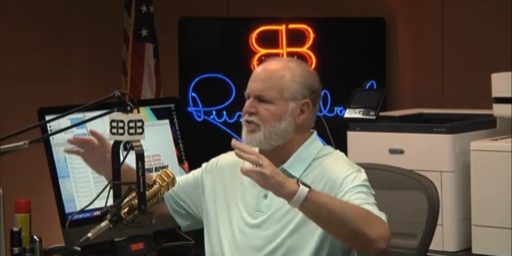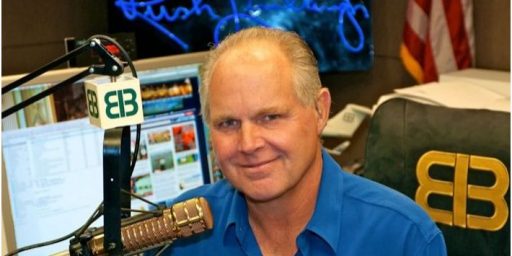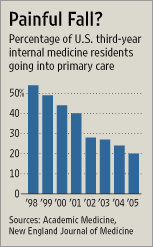Rush Limbaugh and Doctor-Patient Confidentiality
Judge David F. Crow issued a ruling on whether Rush Limbaugh’s doctors can be subpoenaed and forced to testify despite doctor-patient confidentiality. The nature of that ruling is rather confusing, at least if one reads the press.
Here are some headlines from various papers that ran the Associated Press (AP) wire copy:
Judge OKs subpoenas of Limbaugh doctors (CNN)
Judge Allows Subpoenas of Limbaugh Doctors (CBS News)
Judge Allows Subpoenas of Limbaugh Doctors (ABC News)
Judge allows subpoenas of Limbaugh doctors (Seattle Post-Intelligencer)
Judge allows subpoenas of Limbaugh doctors, with restrictions (Tuscaloosa [Alabama] News)
Those headlines are representative of all the papers showing on GoogleNews who ran the AP copy. Here’s the intro:
Prosecutors can subpoena Rush Limbaugh’s doctors as part of an investigation into whether the conservative radio commentator illegally bought painkillers, a judge ruled Monday. Judge David F. Crow ruled that Florida laws do not prevent doctors from talking with prosecutors if the discussion is relevant to the prosecution of a crime.
The decision gave prosecutors permission to subpoena doctors and their staff, but it also protected confidential material in Limbaugh’s medical records. The judge noted that Florida law prohibits the discussion of a patient’s medical condition and information disclosed by a patient during treatment.
Prosecutors and an attorney for Limbaugh both said they benefited from the ruling. “The court allowed us to proceed, within the constraints of present law,” said Mike Edmondson, a spokesman for the state attorney in Palm Beach County.
Roy Black, Rush Limbaugh’s attorney, said in a statement that the decision upheld “our argument that the state cannot breach doctor-patient confidentiality just because it has obtained some medical records,” Black said.
Reading other coverage, though, gives a rather different impression of what happened:
Limbaugh’s docs face quiz – A Palm Beach County judge allows subpoenas of Rush Limbaugh’s doctors, with restrictions. (Miami Herald)
A Palm Beach Circuit judge allowed prosecutors to query Rush Limbaugh’s physicians, but limited what they can ask them as part of a prescription-drug abuse investigation. Authorities suspect that the conservative radio talk-show host had been ”doctor shopping” — illegally seeking multiple prescriptions from different doctors — after learning he had obtained prescriptions for more than 2,000 pills from four different doctors in six months. While Limbaugh, 54, has admitted an addiction to pills, he has not been charged with a crime. The syndicated commentator, a resident of Palm Beach, has been in the spotlight over his alleged illegal use of painkillers for more than two years.
In a 15-page decision, Judge David F. Crow limited the scope of what prosecutors can ask Limbaugh’s doctors. Interrogation, he wrote, shall not include “discussion of the medical condition of the patient and any information disclosed to the healthcare practitioner by the patient in the course of the care and treatment of the patient.”
Bruce Winick, a professor at the University of Miami School of Law, called the ruling ”rather ambiguous” and predicted it would launch another round of litigation. ”It’s an attempt to protect the privacy of patients and, in a sense, seems to be an attempt to balance the interests of both parties,” Winick said. ‘Will it allow prosecutors to ask doctors, `Did you prescribe that?’ Does that reveal anything about the patient’s condition?”
”The court allowed us to proceed, within the constraints of present law,” Mike Edmondson, a spokesman for the state attorney in Palm Beach County, told the Associated Press.
Major win for Limbaugh in medical-records battle — Talk-show giant’s attorney praises ruling protecting doctor-patient confidentiality (WorldNetDaily)
In a major legal victory for Rush Limbaugh, a circuit judge in Florida has ruled state prosecutors cannot ask the radio talk-show host’s doctors about his medical treatment and condition or information he shared with his doctors during his care. The decision could hamper efforts by State Attorney Barry Krischer, a Democrat, to continue his investigation related to Limbaugh’s use of painkillers.
Judge David F. Crow is prohibiting prosecutors from questioning Limbaugh’s doctors about “the medical condition of the patient and any information disclosed to the healthcare practitioner by the patient in the course of the care and treatment of the patient.”
Questioning barred in Limbaugh case — Judge: Without charges, doctors can’t be asked about condition (South Florida Sun Sentinal)
If Palm Beach County prosecutors decide to charge Rush Limbaugh for his prescription drug use, they’ll have to do it without questioning the conservative radio host’s doctors about his medical condition, a judge ruled Monday. Prosecutors can subpoena Limbaugh’s physicians in connection with a “doctor shopping” investigation but can’t ask them many meaningful questions unless the Palm Beach resident has been charged, Circuit Judge David Crow ruled.
Perhaps the clearest summary comes from the Palm Beach Daily News: Judge limits Limbaugh inquiry — Ruling says state prosecutors can question radio host’s doctors, but can’t discuss his medical conditions
Palm Beach County Circuit Court Judge David Crow issued a split decision Monday in the investigation into allegations that talk-show host Rush Limbaugh illegally stockpiled prescription pain medications by going from doctor to doctor. In his 15-page ruling, Crow said prosecutors can go forward with investigative subpoenas to call in Limbaugh’s doctors for questioning. However, he also ruled that they must limit the scope of those questions.
Several sources ran Roy Black’s press release without comment (and strangely in the same odd format that makes cutting and pasting quite difficult):
-
Florida Judge Upholds Rush Limbaugh’s Doctor-Patient Confidentiality (PR Newswire)
Fla. Judge Upholds Rush Limbaugh’s Medical Privacy Rights (NewsMax)
Florida Judge Upholds Rush Limbaugh’s Doctor-Patient Confidentiality (Financial News)
This strikes me as a rather substantial victory for Limbaugh. Writers at TalkLeft agree. One would not get that impression, though, from the AP story or those who used the generic headline “Judge OKs subpoenas of Limbaugh doctors” that apparently accompanied it.
Related:
-
Rush Limbaugh Offers to Mentor Al Sharpton
Florida Supreme Court Denies Rush Limbaugh Appeal
SNL Limbaugh Drug Skit Controversy
Limbaugh Getting Third Divorce
10 Questions For Rush Limbaugh
Limbaugh on ScrappleFace
MONEY LAUNDERING II
LIMBAUGH LAUNDERING
KINDER, GENTLER RUSH?
LIMBAUGH TO RETURN
THE END OF MORALIZING?
RUSH REDUX
RUSH ON RUSH
BLACK QB BIAS?
ESPN IRONY
EASTERBROOK FIRED
ROBERTSON ON LIMBAUGH
WSJ ON RUSH
LIMBAUGH RESIGNS FROM ESPN
RUSH ON ESPN
REAGANISM
RUSH ON RECALL
SENSING ON LIMBAUGH






This strikes me as not such a big win for Limbaugh. The prosecutor will probably use his limited subpoena to ask questions about the medical records, which they already have. The prosecutor can then use that information to obtain an indictment, and then subpoena the Doctor to fully testify at a deposition or at trial.
Despite Black’s spin, a Limbaugh win would have been the elevation of the doctor-patient privlege, or even no testimony without an indictment.
I think that it presents an extra hurdle for the prosecutor, but if he really wants to get Limbaugh one that he can get past.
I am not an attorney, but I am not so sure they can. That whole tree of the poisoned fruit thing-if the prosecutors ask questions that breach the ruling, then anything they learn will be barred from a trial, and make conviction difficult to impossible.